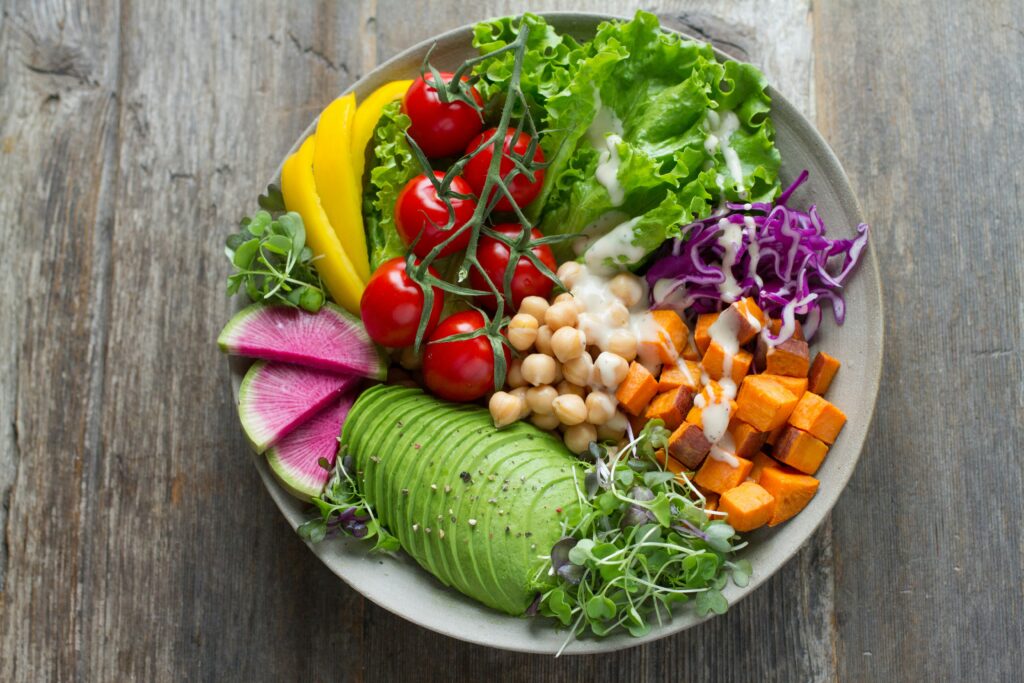
Nutritional Basics for Men
We now that you want a perfect body that why we made a list. Nutritional needs are a cornerstone in the pursuit of an ideal body for men. Understanding these requirements starts with a firm grasp of nutrients.

Photo by Morgan Alley on Unsplash
Proteins, carbohydrates, and fats make up the macronutrient category. Protein is essential for muscle repair and growth, providing the building blocks needed after intense workouts; sources include lean meats, eggs, and legumes. Carbohydrates are the body’s preferred energy source, vital for fueling both workouts and daily activities; they are best sourced from whole grains, fruits, and vegetables. Healthy fats, found in avocados, nuts, and fish, play a crucial role in hormone regulation and cell function.
Micronutrients, while required in smaller amounts, are equally vital. Vitamins such as A, C, D, and E, along with minerals like calcium, magnesium, and zinc, support numerous bodily processes including immune function, bone health, and muscle contraction. A diversified diet rich in colorful fruits, vegetables, and whole foods ensures an ample supply of these nutrients.
The balance of calories consumed and expended also plays a significant role. Calorie surplus can lead to weight gain, potentially contributing to muscle mass when combined with strength training, while a calorie deficit facilitates weight loss. Accurate caloric monitoring, alongside nutrient-dense food choices, sets the foundation for achieving a near-perfect body.
Hydration, often overlooked, is another key player in maintaining a healthy body. PIt’s recommended that individuals aim for at least 8-10 glasses of water daily, adjusting based on activity levels and body size.
Pairing a well-rounded diet with consistent exercise optimizes results, blending dietary science with physical exertion to sculpt the perfect body. Regular strength training, cardiovascular exercises, and flexibility work complement the nutritional strategies, creating a comprehensive approach to health and fitness.
High-Protein Foods for Muscle Growth
Protein plays a crucial role in muscle repair and growth, making it a foundational component in the pursuit of a perfect body for those aiming to increase muscle mass.
Lean meats such as chicken, turkey, and beef are excellent sources of high-quality protein. For instance, a 3-ounce serving of boneless, skinless chicken breast contains about 26 grams of protein.
Its important to be consistent
- Fish, particularly salmon and tuna, also make outstanding protein choices. Salmon offers around 22 grams of protein per 3-ounce serving and is rich in omega-3 fatty acids, which help reduce inflammation and improve muscle recovery. Tuna packs approximately 20 grams of protein per 3-ounce portion and is versatile enough to be incorporated into salads, sandwiches, and main dishes.
- Eggs are another highly nutritious protein source. One large egg provides about 6 grams of protein and contains all nine essential amino acids necessary for muscle growth.
For those looking to add variety, dairy products like Greek yogurt and cottage cheese offer substantial protein content. A single-serving container of Greek yogurt can provide up to 20 grams of protein, while a cup of low-fat cottage cheese contains about 28 grams. These options are not only easy to incorporate into meals but also make convenient on-the-go snacks.
You can do it…
Legumes, such as lentils and chickpeas, serve as fantastic plant-based protein sources. A cup of cooked lentils offers around 18 grams of protein and is also rich in fiber and essential nutrients. Chickpeas, with about 15 grams of protein per cup, can be used in soups, salads, or as a base for dishes like hummus.
Plant-based options like tofu and tempeh also provide muscle-building protein. A 3-ounce serving of tofu averages 9 grams of protein, while tempeh offers around 21 grams for the same serving size.
Incorporating these high-protein foods into your daily diet can be seamless with a few meal prep tips. Preparing and portioning out grilled chicken, roasted turkey, or baked fish at the beginning of the week can save time and ensure protein-packed meals are ready for consumption. Including easy-to-make protein-rich recipes, such as a yogurt parfait for breakfast or a bean salad for lunch, ensures you maintain adequate protein intake throughout the day.
Healthy Fats for Sustained Energy and Hormone Balance
Healthy fats are fundamental in attaining the perfect body, as they provide sustained energy, support hormone production, and aid in nutrient absorption.
Monounsaturated fats help lower bad cholesterol levels and are found in sources such as avocados, olive oil, and many types of nuts and seeds. These foods are not only tasty but also versatile, making them easy to integrate into daily meals. For example, adding sliced avocado to salads, using olive oil as a cooking base, or snacking on a handful of almonds can contribute significantly to daily healthy fat consumption.
Polyunsaturated fats, including omega-3 and omega-6 fatty acids, are essential for maintaining heart health and supporting brain function. Fatty fish like mackerel and herring, along with flaxseeds and walnuts, are excellent sources of omega-3s. Including fish in your diet two to three times a week, sprinkling flaxseeds on your breakfast cereal, or enjoying a walnut-encrusted salad can effortlessly boost your polyunsaturated fat intake.
Contrastingly, trans fats, commonly found in processed and fried foods, should be avoided as they contribute to higher cholesterol levels and increased risk of heart disease. Similarly, while saturated fats are not harmful in moderation, an excess can lead to health issues. These fats are typically present in red meats and full-fat dairy products.
Practical tips for incorporating healthy fats into your daily regimen without overindulging include using a measured amount of olive oil for cooking, opting for nut butters made from pure nuts without added sugars or hydrogenated oils, and choosing whole food sources over processed alternatives. By consciously selecting and preparing meals with healthy fats, men can effectively harness their benefits for sustained energy, improved hormonal health, and overall well-being.
Smart Carbohydrates for Performance and Recovery
Carbohydrates serve as a cornerstone in the quest for achieving the perfect body, particularly when it comes to energy levels and recovery. As a primary fuel source, they are essential for both high-intensity workouts and endurance activities. The primary role of carbohydrates is to supply glucose, which muscles use for sustained energy throughout physical activities. Hence, strategic carbohydrate consumption is crucial for performance enhancement and muscle recovery.
Smart carbohydrate choices come from a variety of nutrient-dense foods. Whole grains such as quinoa, brown rice, and oats are excellent sources that not only provide energy but also contain vital nutrients like fiber and minerals. Fruits are another significant group; berries, apples, and bananas offer easily digestible sugars along with essential vitamins and antioxidants. Vegetables like sweet potatoes, spinach, and broccoli are also pivotal, contributing complex carbohydrates along with a spectrum of phytonutrients.
Legumes, including lentils, beans, and chickpeas, are invaluable as they provide a dual benefit of carbohydrates and proteins, supporting both energy needs and muscle repair. The timing of carbohydrate intake can significantly influence performance and recovery. Consuming carbohydrates before a workout can ensure sufficient glycogen stores, thereby optimizing endurance and power output. Post-workout, the body’s ability to replenish depleted glycogen is most efficient, making it an ideal time to consume carbohydrate-rich foods.
Examples of balanced meals combining carbohydrates with proteins and fats are pivotal for sustained energy and recovery. A pre-workout meal could include a banana with a tablespoon of peanut butter and a slice of whole grain toast, supplying quick and sustained energy. Post-workout options might include a bowl of quinoa salad with grilled chicken, or brown rice with steamed broccoli and a lean cut of beef. These combinations not only replenish muscle glycogen but also aid in protein synthesis and recovery.
